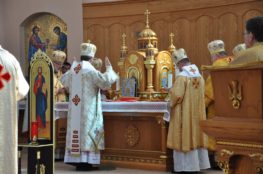For those interested, a reader sent me a message recently asking which English-language Greek Catholic prayer book I use. My reply: None. This is the rest of what I had to say.
To be perfectly blunt, I find the translations in the ones I have seen to be too alien from what I was accustomed to growing up. Although it is now long out of print and arguably “Latinized,” Fr. Julius Grigassy’s English/Slavonic (with Latin letters) My Prayer Book was my preferred option. Fr. Alexander Duchnovich’s Chlib Dusi, which follows 19th/early 20th Century Carpatho-Russian usage, is still available from Holoviak Church Supply. Like My Prayer Book, it is in English and Church Slavonic with Latin letters.
For what it is worth, I still use the Old Orthodox Prayer Book published by the Old-Rite Russian Church of the Nativity in Erie, Pennsylvania. Although there are some divergences from contemporary Slavic-Byzantine praxis, they are minor at best and can be easily worked around if need be. The order for morning and evening prayers is more sensible than some other Orthodox prayer books out there. Additionally, the Old Orthodox Prayer Book contains all the material needed to recite the minor hours outside of Lent; numerous canons and the Akathist to the Mother of God; a comprehensive pre- and post-communion rule; and a wealthy of information concerning pre-Nikonian practices. While the second edition of this excellent book appears to still be available, a third edition is currently underway. If you want something that is in line with contemporary Russian Orthodox praxis, then your best bet is the Jordanville Prayer Book. I still use it now and again because it contains some material not found in the Old Orthodox Prayer Book (e.g., Canon of Repentance, Akathist to Jesus), but it’s not my favorite.
Some Catholics are leery about using “Orthodox books,” but this seems silly to me. Or perhaps I should say that I am too old to change my habits. Even if it is clumsy and slightly inaccurate in parts, I still use Holy Transfiguration Monastery’s Psalter According to the Seventy because I am accustomed to it. I use the Jordanville Horologion and the liturgical books published by St. John of Kronstadt Press for the same reason. No translation is perfect, but unless you want to learn Church Slavonic or Greek, you have to work with what’s available. And let’s be honest. In the Anglophone world at least, the Orthodox have done a better (albeit inconsistent) job than Catholics of translating Eastern prayer and liturgical texts into English. Some folks don’t care for the hieratic English found in the Russian Orthodox books, though there are plenty of alternatives out there. My best advice is to just settle on one text and hold to it rather than run around trying to find the “ideal book.”




October 15, 2015
Any suggestions for a good Greek prayer-book?
October 15, 2015
If you are going to suggest the Jordanville Prayer Book, then mention must be made of the Publican’s Prayer Book published by the Melkite Eparchy of Newton.
https://melkite.org/products-page/prayer-books/publicans-prayer-book
It is basically the text of the Jordanville with the “hyper-Cramnerian” thees and thous and thines changed to reverent modern terms (You and Your). Also small variations like commemoration of the pope since it is a Melkite publication. Beautifully bound too. My priest (OCA, not Melkite!) recommended it.
October 15, 2015
Patricius,
Take a look at The Orthodox Prayer Book by New Rome press. Based on an athonite prayer book, it incorporates the translation of Archimandrite Ephrem Lash.
October 15, 2015
If you want more traditional English, I would say the Holy Transfiguration Monastery prayer book properly reflects Greek praxis. One nice feature is that it uses Small Compline for evening prayer, which is theoretically how it should be done.
October 15, 2015
“One nice feature is that it uses Small Compline for evening prayer, which is theoretically how it should be done.”
Yes, that is something I like about both the HTM prayer book and the New Rome Press one. The services for are not the full hours, but they are heavily based upon them.
October 15, 2015
Thank you for these great suggestions. I am, however, interested in praying in Greek. I am a Catholic and would prefer a prayer book published by the Byzantine Archdioceses in Greece, but I am not adverse to using Orthodox books since, for several years I have been unable to find anything suitable. Thanks!
October 15, 2015
Try this:
http://www.bostonmonks.com/product_info.php/cPath/75_106/products_id/632
October 16, 2015
Ooh, I’ll have to check that out. I already translate on the fly to actual English, but having a text with that done already would be nice. Though usually I just use my phone instead of a book.
October 15, 2015
I too reccommend the Old Orthodox Prayerbook. This is arguably the best one out there for the reasons you mentioned above. I have both the Jordanville and the HTM one as well as still prefer the Old Orthodox to the those. Just having the various hours all in one place is beautiful, not to mention the Old Orthodox Prayerbook has a full calendar of saints with the new style and old style dates AND a Paschalion through the year 2099. You really can’t beat it.
October 15, 2015
Gabriel, what suggestions would you have for Western prayerbooks? The little personal experience I have has been with the lovely Lancelot Andrewes edition Monastic Diurnal.
October 15, 2015
I have used the LA MD before I switched up to using the Breviarium Romanum. As far as a traditional prayer book goes, I would say either Blessed Be God, which is printed by Preserving Christian Publications, or the Christian Warfare prayer book published by the Society of St. Pius X.
October 17, 2015
How do these books compare to the _Anglican Breviary_?
October 15, 2015
Oh, there is also a Western Rite Orthodox prayer book, which is basically Latin Catholic, published by LA entitled The St. Ambrose Prayerbook. An Orthodox priest here in Grand Rapids edited it.
October 15, 2015
Everything published by the Lancelot Press is wonderful, at least that has been my experience. They have also published a series of plainchant missals as well: The St Austin Plainchant Missals. They have also published both the revised 1955 Holy Week manual with chants as well as the pre-1955 version as well. Their prices are good too.
October 15, 2015
I still have my mother’s old eastern rite Catholic missal someplace. It is all in traditional English, except for the Mass, which is English on one side and Church Slavonic in Latin characters on the other (which is difficult for me to read since I leant Church Slavonic with Cyrillic characters). It has all of the propers for the sundays of the year and most great feasts (including Epistles and Gospels). It was published by the Byzantine rite Redemptorists in Canada and really has very few Latinisms other than Benediction and the western rosary. Too bad they do not seem to be publishing such missals any longer.
October 15, 2015
I have seen that book I think,
From my recollection, the Redemptorists were not as heavy on Latinizations as, say, the Basilians and Jesuits. Blessed Mykola Charnetsky, who was a Redemptorist hierarch, was quite forceful on keeping the Byzantine Rite pure, as were some other Redemptorist bishops and priests. Part of their reason was strategic. When the Redemptorist mission expanded out to the Orthodox in Ukraine, the Redemptorists thought it best to reflect the liturgical and clerical norms of the Orthodox population. It seems that they had some success going this route, though it all come to naught once World War II hit and the Soviets took control.
October 15, 2015
Gabriel, I will look for this missal this evening and send more particulars, such a title and date of publication. It is quite nice.